Uncategorized
Crypto Daybook Americas: Bitcoin Slumps as Investors Flock to ‘Doomsday Asset’ Gold

By Omkar Godbole (All times ET unless indicated otherwise)
The crypto market continues to lose ground, driven by disappointment over the absence of a plan for the U.S. government to buy bitcoin under the newly announced strategic reserve plan and amid persistent macroeconomic concerns.
BTC fell to $80,000 late Sunday, trading below the 200-day simple moving average, and ether took out a macro bullish trendline with a dip below the long-held support of $2,100. Other coins followed the two majors, posting bigger losses.
«Many investors are pulling out of bitcoin, viewing it as a risky asset class for the first time since Trump took the White House,» said Zach Burks, CEO and founder of NFT-service provider Mintology. «It’s no longer playing its role as a store of value. Gold prices have spiked as many go back to the original ‘doomsday asset,’ which is no surprise as tariffs and grenades continues to get thrown across the free world.»
The tariffs are making it harder for the Fed to move forward with rate cuts despite the continued decline trend in real-time inflation indicators. On Friday, Fed chairman Jerome Powell said the central bank is waiting for greater clarity on Trump’s policies before making the next move.
Meanwhile, Japan’s fastest base pay rise in 32 years strengthened the case for a BOJ rate hike, pushing the nation’s bond yields and the yen higher. Bouts of strength in the haven currency typically breed downside volatility in risk assets.
Still, some observers are unsure if the market weakness, particularly seen over the weekend, could be long-lasting. «Trading volumes over the weekend were extremely low, reducing the value of the bearish signal,» Alex Kuptsikevich, the FxPro chief market analyst, told CoinDesk.
«We note that sellers push the price down in periods of low liquidity, but the price bounces back with the arrival of institutional buyers. It looks like the big buyers have enough liquidity left to buy out the drawdown,» Kuptsikevich said. Stay alert!
What to Watch
Crypto:
March 10: Movement (MOVE), an Ethereum-based L2 blockchain, has its mainnet launch.
March 11, 9:00 a.m.: Horizen (ZEN) mainnet network upgrade to version ZEN 5.0.6 at the block height of 1,730,680.
March 11, 10:00 a.m.: U.S. House Financial Services Committee hearing about a federal framework for stablecoins and a U.S. CBDC. Livestream link.
March 11: The Bitcoin Policy Institute and U.S. Senator Cynthia Lummis co-host the invitation-only one-day event «Bitcoin for America» in Washington.
March 12: Hemi (HEMI), an L2 blockchain that operates on both Bitcoin and Ethereum, has its mainnet launch.
March 15: Athene Network (ATH) mainnet launch.
March 15: Reploy will close its V1 RAI staking program to new users as it transitions to a fully automated revenue-sharing protocol.
March 17.: CME Group launches solana (SOL) futures.
Macro
March 10, 7:50 p.m.: Japan’s Cabinet Office releases (final) Q4 GDP data.
GDP Growth Annualized Prev. 1.2%
GDP Growth Rate QoQ Est. 0.7% vs. Prev. 0.3%
March 11, 8:00 a.m.: The Brazilian Institute of Geography and Statistics (IBGE) releases January industrial production data.
Industrial Production MoM Prev. -0.3%
Industrial Production YoY Prev. 1.6%
March 11, 10:00 a.m.: The U.S. Department of Labor releases January’s JOLTs report (job openings, hires, and separations).
Job Openings Est. 7.71M vs. Prev. 7.6M
Job Quits Prev. 3.197M
Earnings (Estimates based on FactSet data)
March 17 (TBC): Bit Digital (BTBT), $-0.05
March 18 (TBC): TeraWulf (WULF), $-0.04
March 24 (TBC): Galaxy Digital Holdings (TSE: GLXY), C$0.39
Token Events
Governance votes & calls
GMX DAO is voting on the decentralization and automation of the fee distribution process for the GMX ecosystem to ensure “real-time, trustless, and verifiable fee allocations.”
Aavegotchi DAO is voting on using the auto swapper contract to turn $2 million worth of stablecoins into GHST.
Frax DAO is discussing upgrading the protocol by renaming FXS to FRAX, making it the gas token on Fraxtal, implementing the Frax North Star hard fork and introducing a tail emission plan with gradually decreasing emissions and other enhancements.
March 10, 9 a.m.: Waves to host an Ask Me Anything (AMA) session with founder Sasha Ivanov.
March 13, 10 a.m.: Mantra to host a Community Connect call with its CEO and Co-Founder to discuss various major updates.
Unlocks
March 12: Aptos (APT) to unlock 1.93% of circulating supply worth $62.09 million.
March 15: Starknet (STRK) to unlock 2.33% of its circulating supply worth $10.25 million.
March 15: Sei (SEI) to unlock 1.19% of its circulating supply worth $10.99 million.
March 16: Arbitrum (ARB) to unlock 2.1% of its circulating supply worth $33.46 million.
March 18: Fasttoken (FTN) to unlock 4.66% of its circulating supply worth $80 million.
March 21: Immutable (IMX) to unlock 1.39% of circulating supply worth $13.13 million.
Token Listings
March 11: Bybit to delist Bancor (BNT), Paxos Gold (PAXG) and Threshold.
March 31: Binance to delist USDT, FDUSD, TUSD, USDP, DAI, AEUR, UST, USTC and PAXG.
Conferences
CoinDesk’s Consensus is taking place in Toronto on May 14-16. Use code DAYBOOK and save 15% on passes.
Day 1 of 2: MoneyLIVE Summit (London)
Day 1 of 3: AIBC Africa (Cape Town)
March 11-12: VanEck Southern California Blockchain Conference 2025 (Los Angeles)
March 13-14: Web3 Amsterdam ‘25
March 16, 6:00 p.m.: Solana AI Summit (San Jose, Calif.)
March 18-20: Digital Asset Summit 2025 (New York)
March 18-20: Fintech Americas Miami 2025
March 19-20: Next Block Expo (Warsaw)
March 24-26: Merge Buenos Aires
March 25-26: PAY360 2025 (London)
March 25-27: Mining Disrupt (Fort Lauderdale, Fla.)
March 26: Crypto Assets Conference (Frankfurt)
March 26: DC Blockchain Summit 2025 (Washington)
March 26-28: Real World Crypto Symposium 2025 (Sofia, Bulgaria)
March 27: Building Blocks (Tel Aviv)
March 27: Digital Euro Conference 2025 (Frankfurt)
March 27: WIKI Finance EXPO Hong Kong 2025
March 27-28: Money Motion 2025 (Zagreb, Croatia)
March 28: Solana APEX (Cape Town)
Token Talk
By Shaurya Malwa
Zerebro (ZEREBRO), once a celebrated AI agent token, has crashed 96% from its January peak market cap of above $800 million to just $33.5 million.
AI agent tokens were among the hottest sectors in October and November, seeing rapid listings by exchanges and promotion by influencers on the narrative of a confluence between crypto and artificial intelligence.
Zerebro created its own music album and offered NFTs to fans, with plans of introducing a platform that allows token holders to launch their own AI agents. It reached over 120,000 followers on X in a short period.
Fundamentals remain strong, however, offering hope for those looking to invest in AI agent tokens. The project was selected as one of the validators for IP-focused blockchain Story last week, playing a role in a future economy that is wholly run by AI agents and machines.
A validator is a critical participant in a blockchain network, responsible for verifying and validating transactions and blocks to ensure the security and consensus of any network.
Story Protocol validators have specific responsibilities tailored to the protocol’s mission of managing and monetizing intellectual property on a blockchain, and the validators are paid in return for ensuring the network keeps functioning.
Derivatives Positioning
Perpetual funding rates in BTC, SOL, ADA, XRP and TRX have flipped negative, pointing to a bias for shorts as the market wilts.
Open interest in futures tied to BNB, HYPE, OM and DOT has increased in the past 24 hours, a sign of traders shorting in a falling market.
On Deribit, traders have snapped puts at $85K and $80K strikes while long positions in the $75K put rolled out or moved to June expiry.
ETH puts have been in demand as well, trading at a premium to calls out to June expiry.
Market Movements:
BTC is down 4.61% from 4 p.m. ET Friday at $82,373.88 (24hrs: -3.21%)
ETH is down 1.6% at $2,101.66 (24hrs: -2.04%)
CoinDesk 20 is down 6.4% at 2,632.12 (24hrs: -3.26%)
Ether CESR Composite Staking Rate is down 8 bps at 3%
BTC funding rate is at 0.0015% (1.67% annualized) on Binance
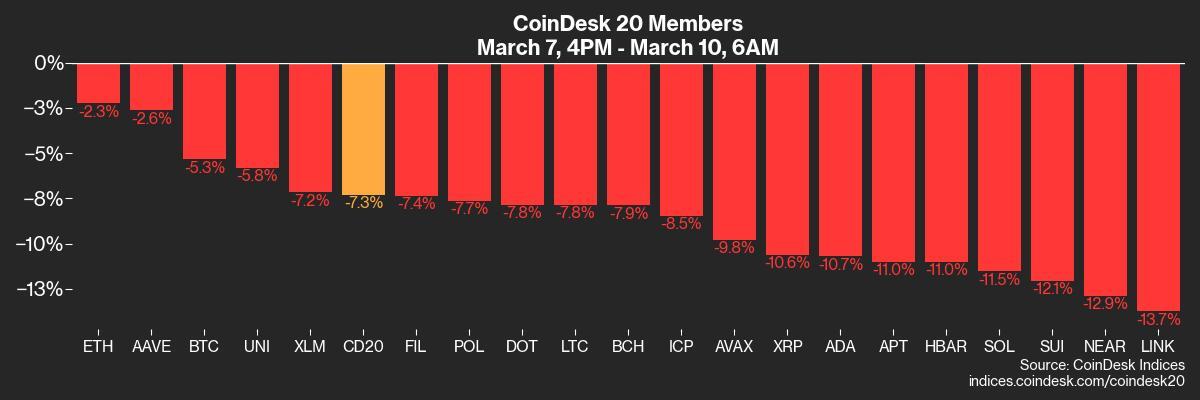
DXY is down 0.14% at 103.76
Gold is up 0.15% at $2,909.10/oz
Silver is up 1.14% at $32.92/oz
Nikkei 225 closed +0.38% at 37,028.27
Hang Seng closed -1.85% at 23,783.49
FTSE is down 0.59% at 8,629.02
Euro Stoxx 50 is down 0.96% at 5,415.85
DJIA closed on Friday +0.52% at 42,801.72
S&P 500 closed +0.55% at 5,770.20
Nasdaq closed +0.7% at 18,196.22
S&P/TSX Composite Index closed +0.71% at 24,758.80
S&P 40 Latin America closed +0.73% at 2,361.82
U.S. 10-year Treasury rate is down 5 bps at 4.25%
E-mini S&P 500 futures are down 1.16% at 5,709.25
E-mini Nasdaq-100 futures are down 1.34% at 19,958.25
E-mini Dow Jones Industrial Average Index futures are down 0.96% at 42,428.00
Bitcoin Stats:
BTC Dominance: 61.19 (-0.14%)
Ethereum to bitcoin ratio: 0.02562 (2.40%)
Hashrate (seven-day moving average): 813 EH/s
Hashprice (spot): $48.2
Total Fees: 4.4 BTC / $371,994
CME Futures Open Interest: 142,260 BTC
BTC priced in gold: 28.2 oz
BTC vs gold market cap: 8.01%
Technical Analysis
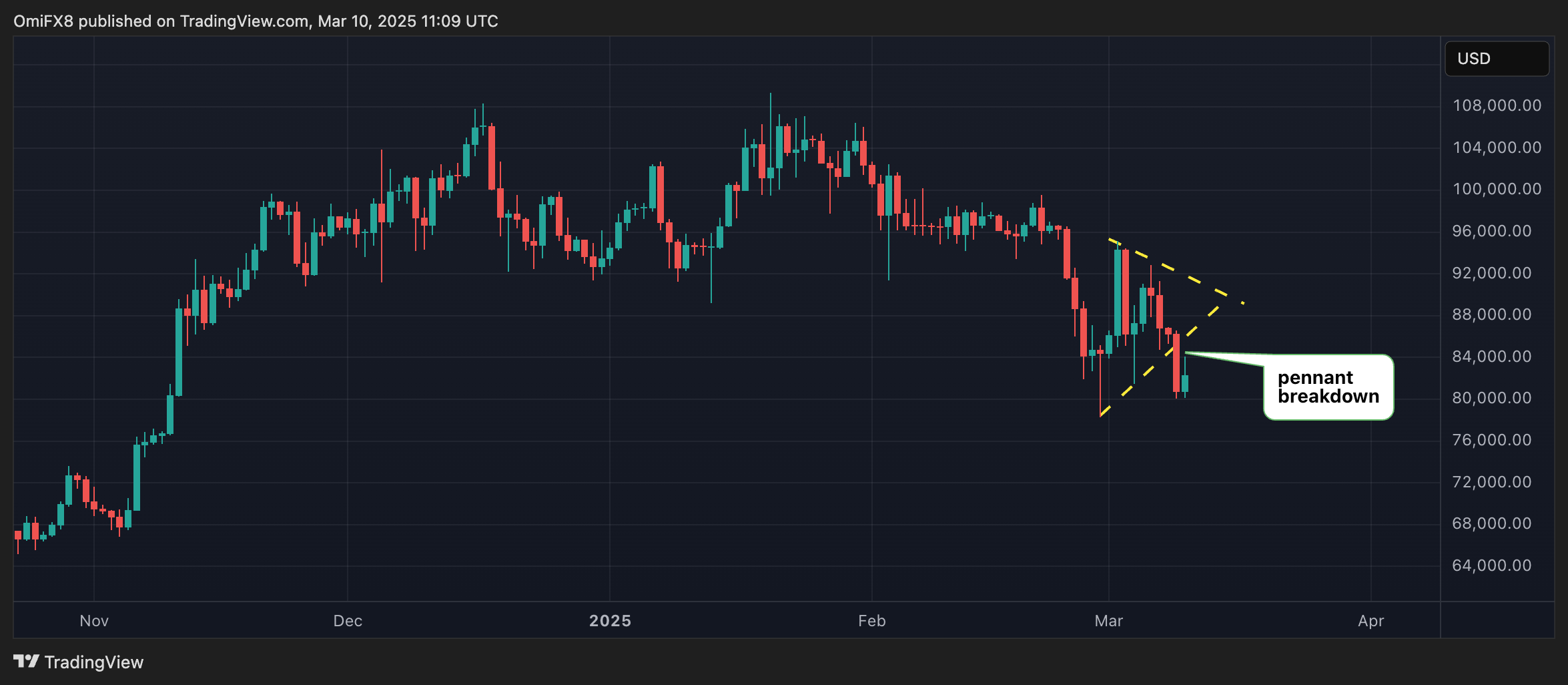
BTC has dived below a pennant pattern, hinting at the continuation of the broader decline from December highs.
The breakdown has strengthened the case for a retest of the former resistance-turned-support at around $73,800, the March 2024 high.
A pennant is a continuation pattern, representing a mid-trend triangular consolidation.
Crypto Equities
Strategy (MSTR): closed on Friday at $287.18 (-5.57%), down 5.33% at $271.87 in pre-market
Coinbase Global (COIN): closed at $217.45 (+1.53%), down 5.36% at $205.79
Galaxy Digital Holdings (GLXY): closed at C$18.84 (+0.11%)
MARA Holdings (MARA): closed at $16.02 (+6.16%), down 4.24% at $15.34
Riot Platforms (RIOT): closed at $8.37 (+3.21%), down 4.42% at $8
Core Scientific (CORZ): closed at $7.78 (-0.89%), down 2.7% at $7.57
CleanSpark (CLSK): closed at $8.83 (+8.34%), down 3.85% at $8.49
CoinShares Valkyrie Bitcoin Miners ETF (WGMI): closed at $16.32 (+3.29%), down 6.25% at $15.30
Semler Scientific (SMLR): closed at $37.19 (+3.02%), down 3.47% at $35.90
Exodus Movement (EXOD): closed at $29.40 (+0.34%), up 6.22% in pre-market
ETF Flows
Spot BTC ETFs:
Daily net flow: -$409.3 million
Cumulative net flows: $36.21 billion
Total BTC holdings ~ 1,137 million.
Spot ETH ETFs
Daily net flow: -$23.1 million
Cumulative net flows: $2.72 billion
Total ETH holdings ~ 3.635 million.
Source: Farside Investors
Overnight Flows
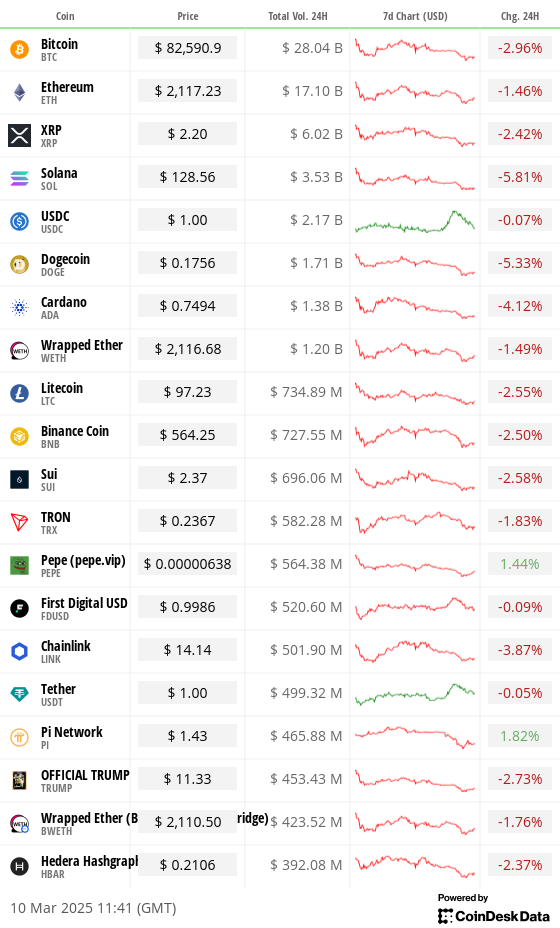
Chart of the Day
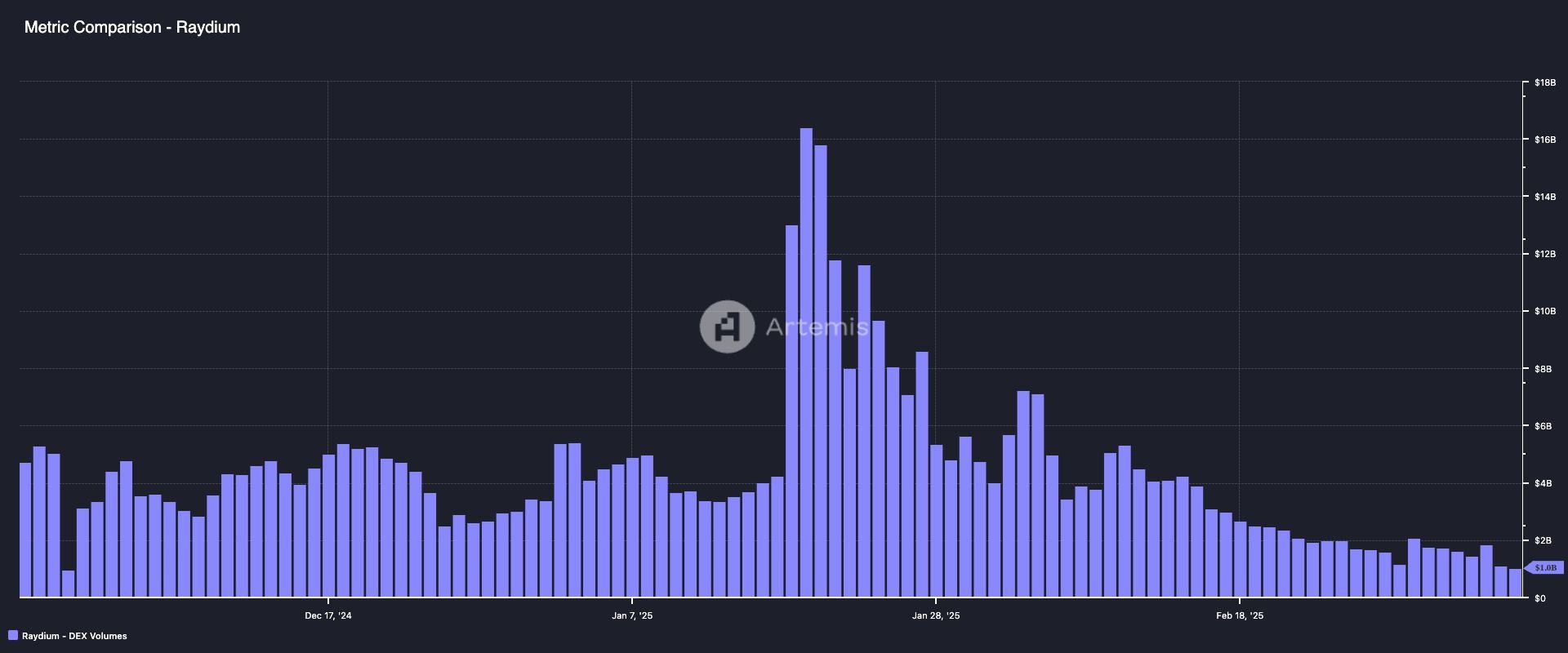
The chart shows the daily volume on Solana’s decentralized exchange Raydium has dropped to $1 billon, the lowest since Nov. 29 and significantly below the Jan. 19 peak of $16.4 billion.
The sharp decline in activity helps explain the price swoon in Solana’s SOL token.
While You Were Sleeping
Howard Lutnick Plays Down Recession Fears as BTC Lingers in $80K Range (CoinDesk): Commerce Secretary Howard Lutnick dismissed recession concerns, saying Trump’s tariff strategy will drive $1.3 trillion in investment and boost U.S. growth.
Ether’s 20% Plunge Shatters Bull Market Trendline Created After 2022 Terra Crash (CoinDesk): ETH’s posted its worst weekly drop since November 2022, breaking a bullish trendline from mid-2022 and signaling the potential for further losses.
Stablecoin Market Cap Tops $200B as U.S. Sees Industry Helping Maintain Dollar Dominance (CoinDesk): U.S. Treasury Secretary Scott Bessent said stablecoins will help keep the dollar as the top reserve currency.
Oil Prices Decline As Tariff Uncertainty Keeps Investors on Edge (Reuters): Oil prices fell as uncertainty over U.S. tariffs, concerns about American economic growth, rising OPEC+ production, Saudi price cuts and deflationary pressures from China weighed on sentiment.
Trump Declines to Rule Out Recession (The Wall Street Journal): In a Sunday interview, the U.S. president acknowledged his policies, including tariffs and budget cuts, may cause near-term instability but maintained they would strengthen the economy over time.
Japan 10-Year Yield at Highest Since 2008 on Bets for BOJ Hikes (Bloomberg): Strong wage growth and weak demand at a recent government debt auction strengthened expectations for a Bank of Japan interest-rate increase, with markets pricing in an 85% chance by July.
In the Ether


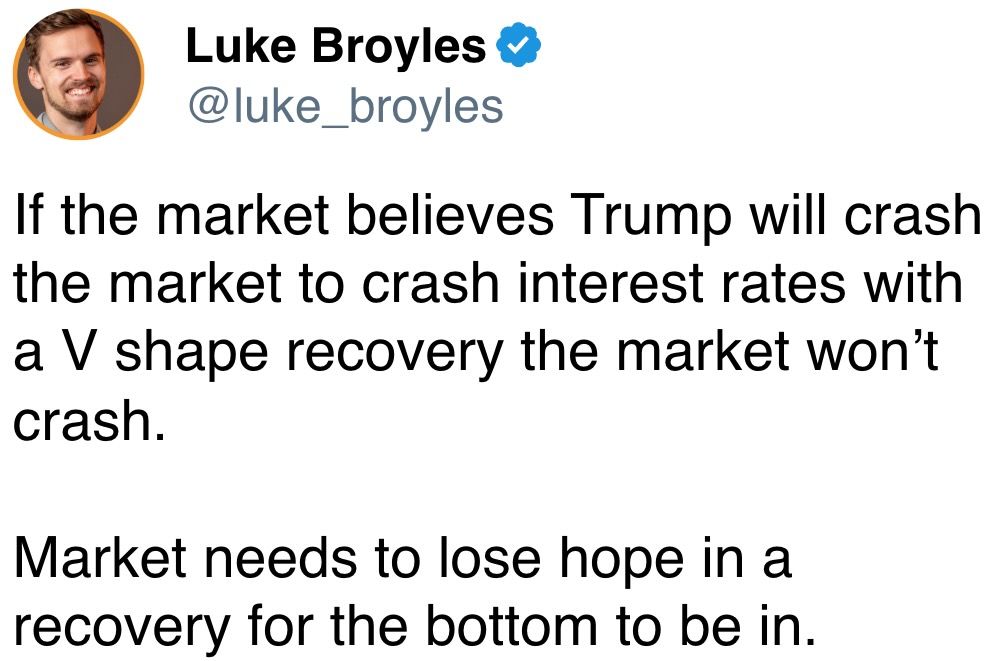
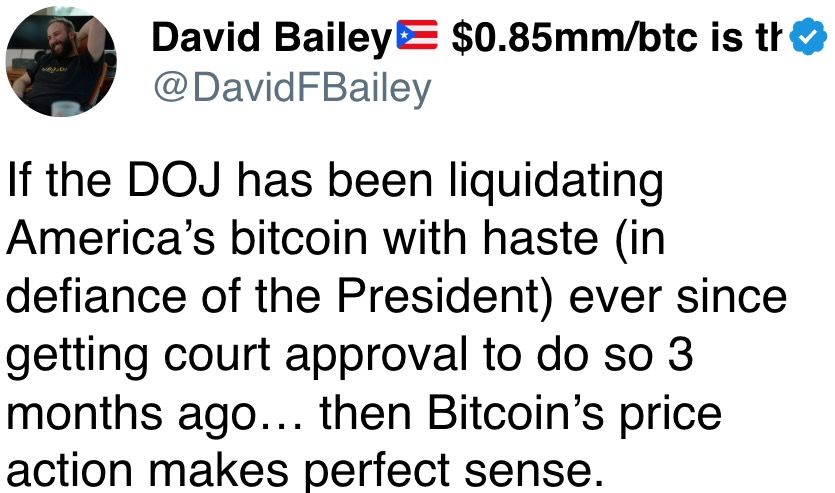
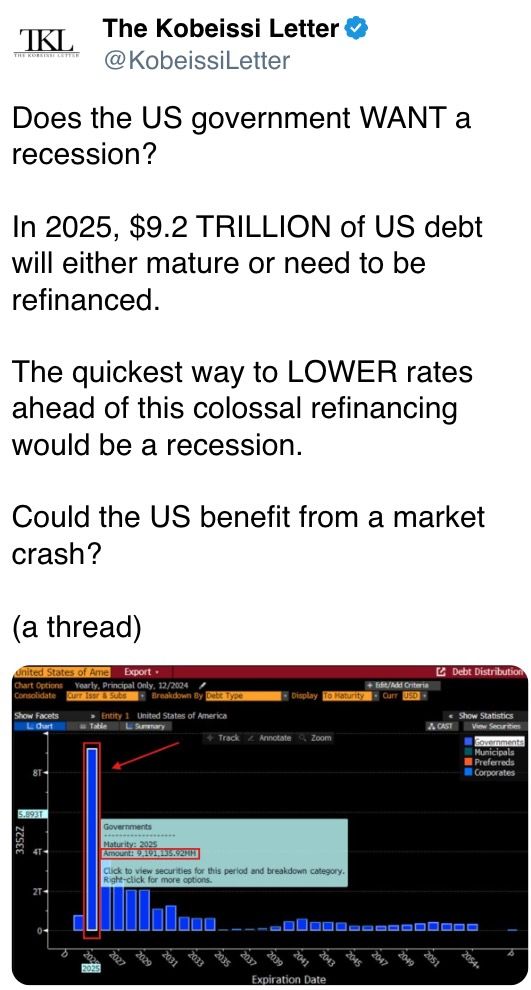
Uncategorized
Asia Morning Briefing: Fragility or Back on Track? BTC Holds the Line at $115K

Good Morning, Asia. Here’s what’s making news in the markets:
Welcome to Asia Morning Briefing, a daily summary of top stories during U.S. hours and an overview of market moves and analysis. For a detailed overview of U.S. markets, see CoinDesk’s Crypto Daybook Americas.
Bitcoin (BTC) traded just above $115k in Asia Tuesday morning, slipping slightly after a strong start to the week.
The modest pullback followed a run of inflows into U.S. spot ETFs and lingering optimism that the Federal Reserve will cut rates next week. The moves left traders divided: is this recovery built on fragile foundations, or is crypto firmly back on track after last week’s CPI-driven jitters?
That debate is playing out across research desks. Glassnode’s weekly pulse emphasizes fragility. While ETF inflows surged nearly 200% last week and futures open interest jumped, the underlying spot market looks weak.
Buying conviction remains shallow, Glassnode writes, funding rates have softened, and profit-taking is on the rise with more than 92% of supply in profit.
Options traders have also scaled back downside hedges, pushing volatility spreads lower, which Glassnode warns leaves the market exposed if risk returns. The core message: ETFs and futures are supporting the rally, but without stronger spot flows, BTC remains vulnerable.
QCP takes the other side.
The Singapore-based desk says crypto is “back on track” after CPI confirmed tariff-led inflation without major surprises. They highlight five consecutive days of sizeable BTC ETF inflows, ETH’s biggest inflow in two weeks, and strength in XRP and SOL even after ETF delays.
Traders, they argue, are interpreting regulatory postponements as inevitability rather than rejection. With the Altcoin Season Index at a 90-day high, QCP sees BTC consolidation above $115k as the launchpad for rotation into higher-beta assets.
The divide underscores how Bitcoin’s current range near $115k–$116k is a battleground. Glassnode calls it fragile optimism; QCP calls it momentum. Which side is right may depend on whether ETF inflows keep offsetting profit-taking in the weeks ahead.
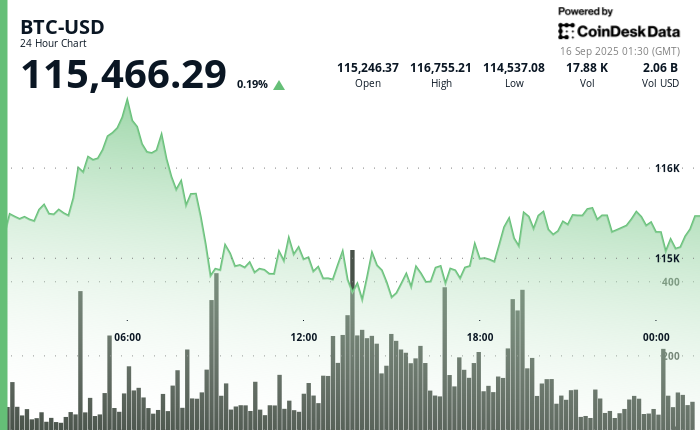
Market Movement
BTC: Bitcoin is consolidating near the $115,000 level as traders square positions ahead of expected U.S. Fed policy moves; institutional demand via spot Bitcoin ETFs is supporting upside
ETH: ETH is trading near $4500 in a key resistance band; gains are being helped by renewed institutional demand, tightening supply (exchange outflows), and positive technical setups.
Gold: Gold continues to hold near record highs, underpinned by expectations of Fed interest rate cuts, inflation risk, and investor demand for safe havens; gains tempered somewhat by profit‑taking and a firmer U.S. dollar
Nikkei 225: Japan’s Nikkei 225 topped 45,000 for the first time Monday, leading Asia-Pacific gains as upbeat U.S.-China trade talks and a TikTok divestment framework lifted sentiment.
S&P 500: The S&P 500 rose 0.5% to close above 6,600 for the first time on Monday as upbeat U.S.-China trade talks and anticipation of a Fed meeting lifted stocks.
Elsewhere in Crypto
Uncategorized
Wall Street Bank Citigroup Sees Ether Falling to $4,300 by Year-End

Wall Street giant Citigroup (C) has launched new ether (ETH) forecasts, calling for $4,300 by year-end, which would be a decline from the current $4,515.
That’s the base case though. The bank’s full assessment is wide enough to drive an army regiment through, with the bull case being $6,400 and the bear case $2,200.
The bank analysts said network activity remains the key driver of ether’s value, but much of the recent growth has been on layer-2s, where value “pass-through” to Ethereum’s base layer is unclear.
Citi assumes just 30% of layer-2 activity contributes to ether’s valuation, putting current prices above its activity-based model, likely due to strong inflows and excitement around tokenization and stablecoins.
A layer 1 network is the base layer, or the underlying infrastructure of a blockchain. Layer 2 refers to a set of off-chain systems or separate blockchains built on top of layer 1s.
Exchange-traded fund (ETF) flows, though smaller than bitcoin’s (BTC), have a bigger price impact per dollar, but Citi expects them to remain limited given ether’s smaller market cap and lower visibility with new investors.
Macro factors are seen adding only modest support. With equities already near the bank’s S&P 500 6,600 target, the analysts do not expect major upside from risk assets.
Read more: Ether Bigger Beneficiary of Digital Asset Treasuries Than Bitcoin or Solana: StanChart
Uncategorized
XLM Sees Heavy Volatility as Institutional Selling Weighs on Price

Stellar’s XLM token endured sharp swings over the past 24 hours, tumbling 3% as institutional selling pressure dominated order books. The asset declined from $0.39 to $0.38 between September 14 at 15:00 and September 15 at 14:00, with trading volumes peaking at 101.32 million—nearly triple its 24-hour average. The heaviest liquidation struck during the morning hours of September 15, when XLM collapsed from $0.395 to $0.376 within two hours, establishing $0.395 as firm resistance while tentative support formed near $0.375.
Despite the broader downtrend, intraday action highlighted moments of resilience. From 13:15 to 14:14 on September 15, XLM staged a brief recovery, jumping from $0.378 to a session high of $0.383 before closing the hour at $0.380. Trading volume surged above 10 million units during this window, with 3.45 million changing hands in a single minute as bulls attempted to push past resistance. While sellers capped momentum, the consolidation zone around $0.380–$0.381 now represents a potential support base.
Market dynamics suggest distribution patterns consistent with institutional profit-taking. The persistent supply overhead has reinforced resistance at $0.395, where repeated rally attempts have failed, while the emergence of support near $0.375 reflects opportunistic buying during liquidation waves. For traders, the $0.375–$0.395 band has become the key battleground that will define near-term direction.
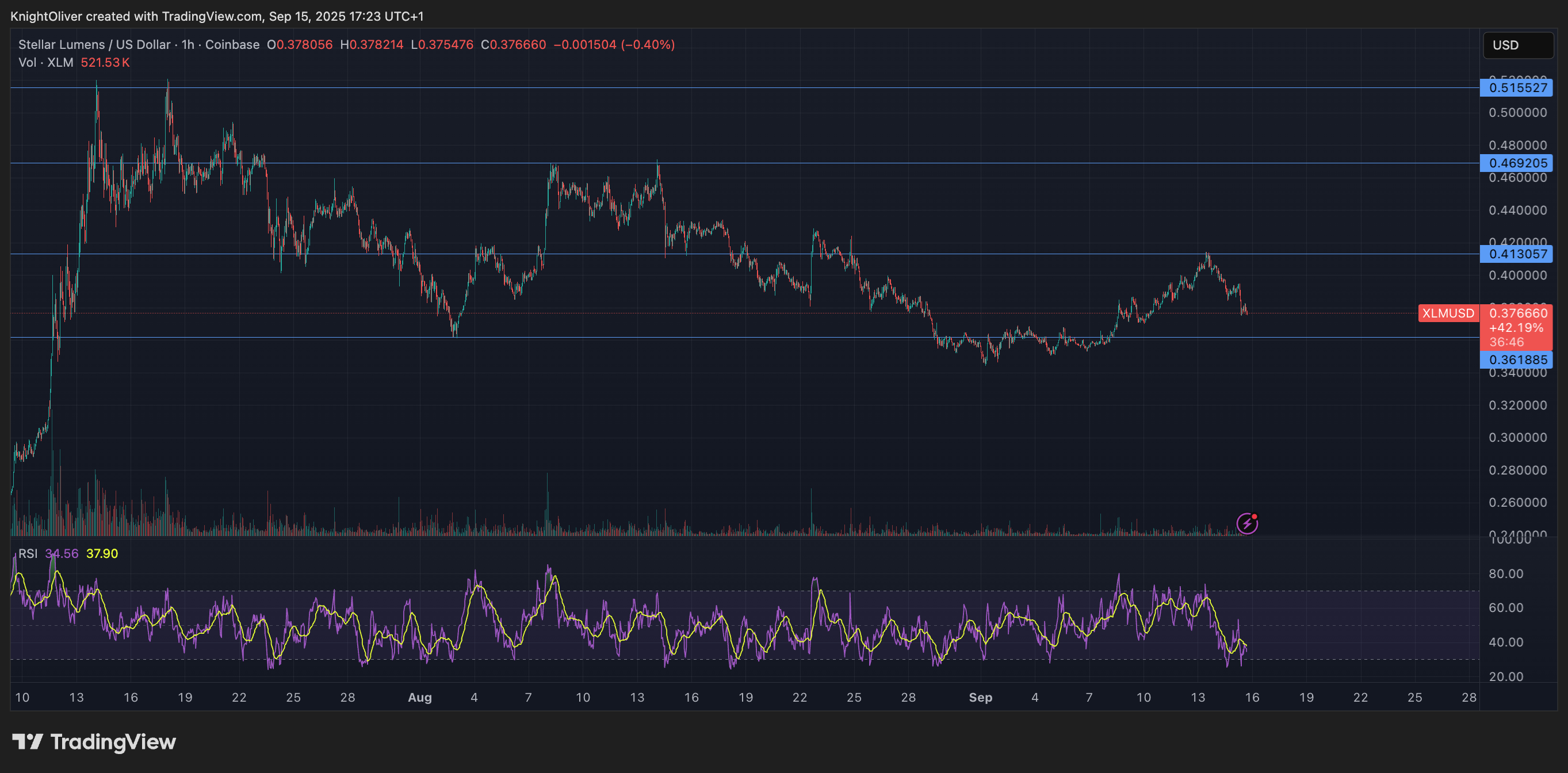
Technical Indicators
- XLM retreated 3% from $0.39 to $0.38 during the previous 24-hours from 14 September 15:00 to 15 September 14:00.
- Trading volume peaked at 101.32 million during the 08:00 hour, nearly triple the 24-hour average of 24.47 million.
- Strong resistance established around $0.395 level during morning selloff.
- Key support emerged near $0.375 where buying interest materialized.
- Price range of $0.019 representing 5% volatility between peak and trough.
- Recovery attempts reached $0.383 by 13:00 before encountering selling pressure.
- Consolidation pattern formed around $0.380-$0.381 zone suggesting new support level.
Disclaimer: Parts of this article were generated with the assistance from AI tools and reviewed by our editorial team to ensure accuracy and adherence to our standards. For more information, see CoinDesk’s full AI Policy.
-

 Business11 месяцев ago
Business11 месяцев ago3 Ways to make your business presentation more relatable
-

 Fashion11 месяцев ago
Fashion11 месяцев agoAccording to Dior Couture, this taboo fashion accessory is back
-

 Entertainment11 месяцев ago
Entertainment11 месяцев ago10 Artists who retired from music and made a comeback
-

 Entertainment11 месяцев ago
Entertainment11 месяцев ago\’Better Call Saul\’ has been renewed for a fourth season
-

 Entertainment11 месяцев ago
Entertainment11 месяцев agoNew Season 8 Walking Dead trailer flashes forward in time
-

 Business11 месяцев ago
Business11 месяцев ago15 Habits that could be hurting your business relationships
-

 Entertainment11 месяцев ago
Entertainment11 месяцев agoMeet Superman\’s grandfather in new trailer for Krypton
-

 Entertainment11 месяцев ago
Entertainment11 месяцев agoDisney\’s live-action Aladdin finally finds its stars





